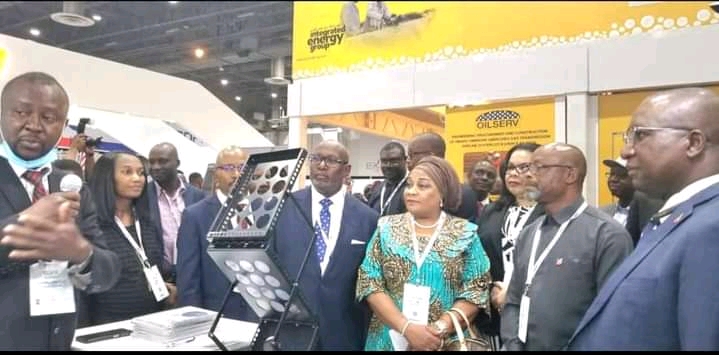Business
NNPC, IOCs Sign Pact To Generate $500bn Revenue …To Produce 10bn Barrels Oil From Five OMLs

The Nigerian National Petroleum Company (NNPC) Limited and International Oil Companies (IOCs) operating in Nigeria, on Friday, signed various agreements that would ensure the production of about 10 billion barrels of crude oil and generate over $500bn revenue to all parties involved.
NNPC officials and their counterparts from the IOCs including Shell, Chevron, Texaco, Sinopec, Sapetro, Esso Exploration and Production Nigeria Limited, among others, renewed their agreements in five Oil Mining Leases (OMLs) that included OMLs 128, 130,132, 133, and 138.
The agreements renewed by the parties were Production Sharing Contracts (PSC) as well as Dispute Resolution Agreements (DRA) among others, at a signing ceremony held at the Abuja headquarters of NNPC.
Speaking at the event, the Group General Manager, National Petroleum Investment Management Services, Bala Wunti, said, “Cumulatively we hope to produce and monetise over 10 billion barrels of oil with these signatures that we had today.
“And this by no means will give significant revenue for all the parties. We expect over $500bn of revenue for all the stakeholders.”
Earlier, the Group Chief Executive Officer, NNPC, Mele Kyari, had explained that the Petroleum Industry Act 2021 gave NNPC the legal backing to renegotiate all its existing PSCs in conformance to the provisions of the new Act within a one-year period.
The PIA became law on August 16, 2021 after it was signed into law the same day by the President, Muhammadu Buhari.
The PIA in Section 311(2) stipulates that new PSC agreements under new heads of terms will be signed between NNPC Ltd as concessionaire and its contracting parties within one year of signing the PIA into law, giving a deadline of August 15, 2022.
Kyari noted that this provision paved the way for the resolution of lingering disputes which created investment uncertainty and stifled new investments in the nation’s deep offshore assets.
To achieve this, he said NNPC leveraged the near end-term of the PSCs and the parties’ interest to renew the PSCs as a negotiation currency in bringing the contractors to work towards trading the past for the future.
“These renewed PSCs would provide several benefits such as improved long-term relationships with contractors, elimination of contractual ambiguities especially in relation to gas terms, enablement of early contract renewal, among others,” he stated.
Kyari added, “The signing of the new PSCs is a key milestone achievement by NNPC Ltd which would ultimately unlock opportunities within the Nigeria upstream sector.
“The execution of the PSCs will deepen investment and development of Nigeria’s rich petroleum resources and ensure that the trifold mandate of the NNPC Ltd to ensure energy availability, sustainability, and accessibility is achieved.
“Ultimately, the new PSCs will provide an inflow of Foreign Direct Investment, expanded access to affordable energy, job creation and socio-economic development.”
Business
NCDMB, Dangote Refinery Unveil JTC On Deepening Local Content
Business
Food Security: NDDC Pays Counterpart Fund For LIFE-ND Project
Business
Replace Nipa Palms With Mangroove In Ogoni, Group Urges FG, HYPREP
-
Sports2 days ago
Eagles B Players Admit Pressure For CHAN Qualification
-

 Niger Delta1 day ago
Niger Delta1 day agoNDLEA Intercepts 584.171kg Hard Drugs In Bayelsa … Arrests 559 Suspects
-
Rivers1 day ago
Four Internet Fraudstars Get Different Jail Terms In PH
-
Business1 day ago
Food Security: NDDC Pays Counterpart Fund For LIFE-ND Project
-
Business1 day ago
PH Women Plan Alternative Stew, Shun Tomato High Prices
-
Foods/Drinks2 days ago
What To Know About Your Menu
-

 Niger Delta1 day ago
Niger Delta1 day agoEx-IYC President Lampoons Atiku’s Presidential Ambition … Declares It Negative Impact On N’Delta
-
News1 day ago
Tinubu Never Stopped 5-year Visa For U S. Citizens – Presidency ?

